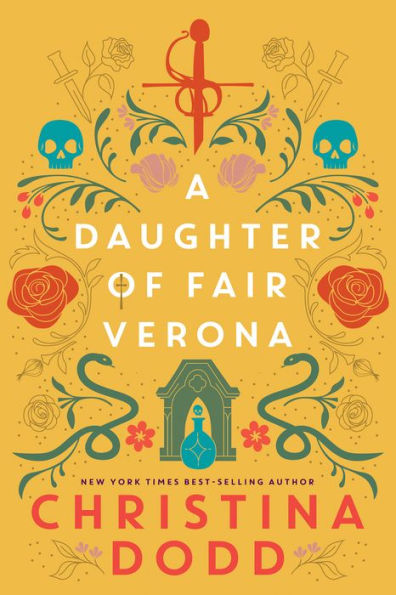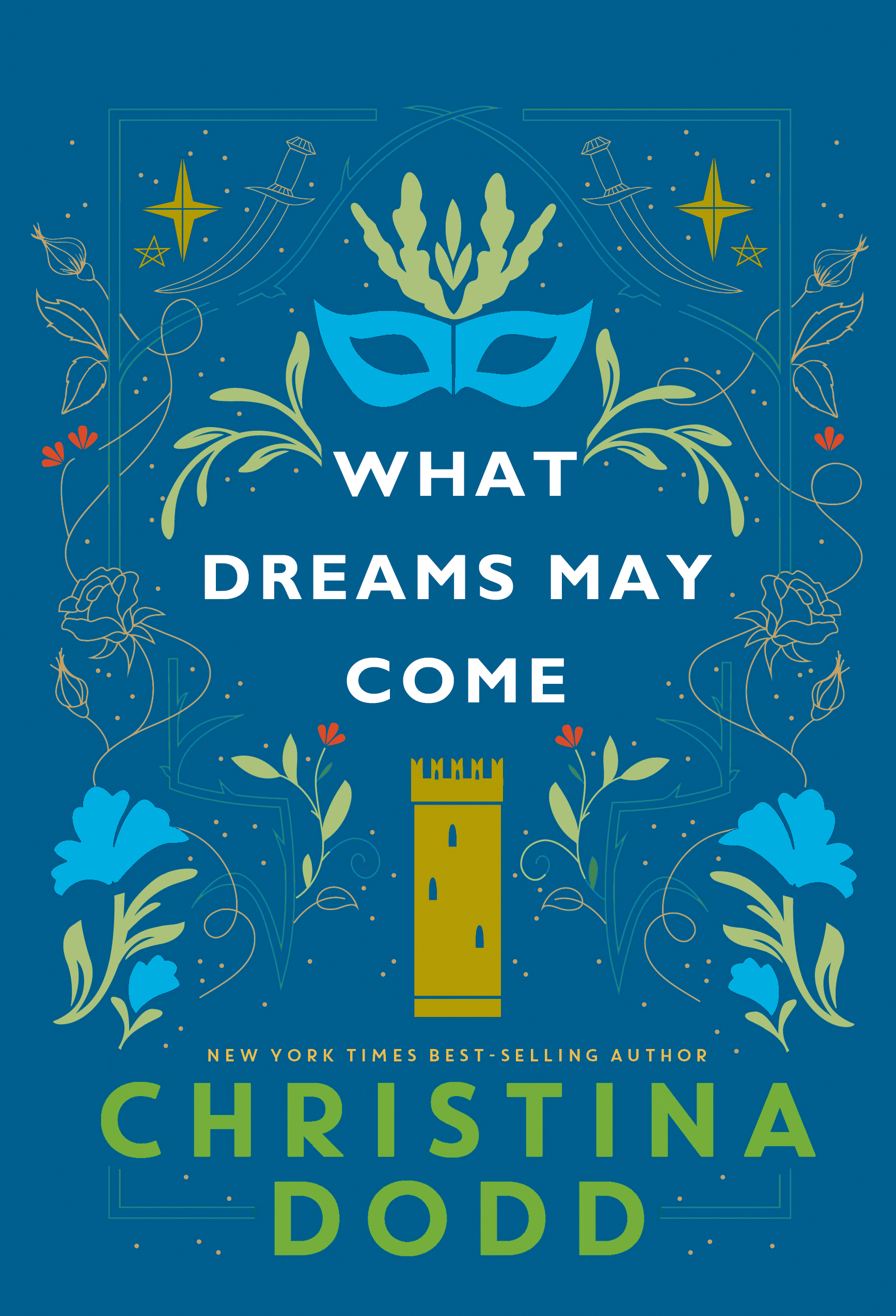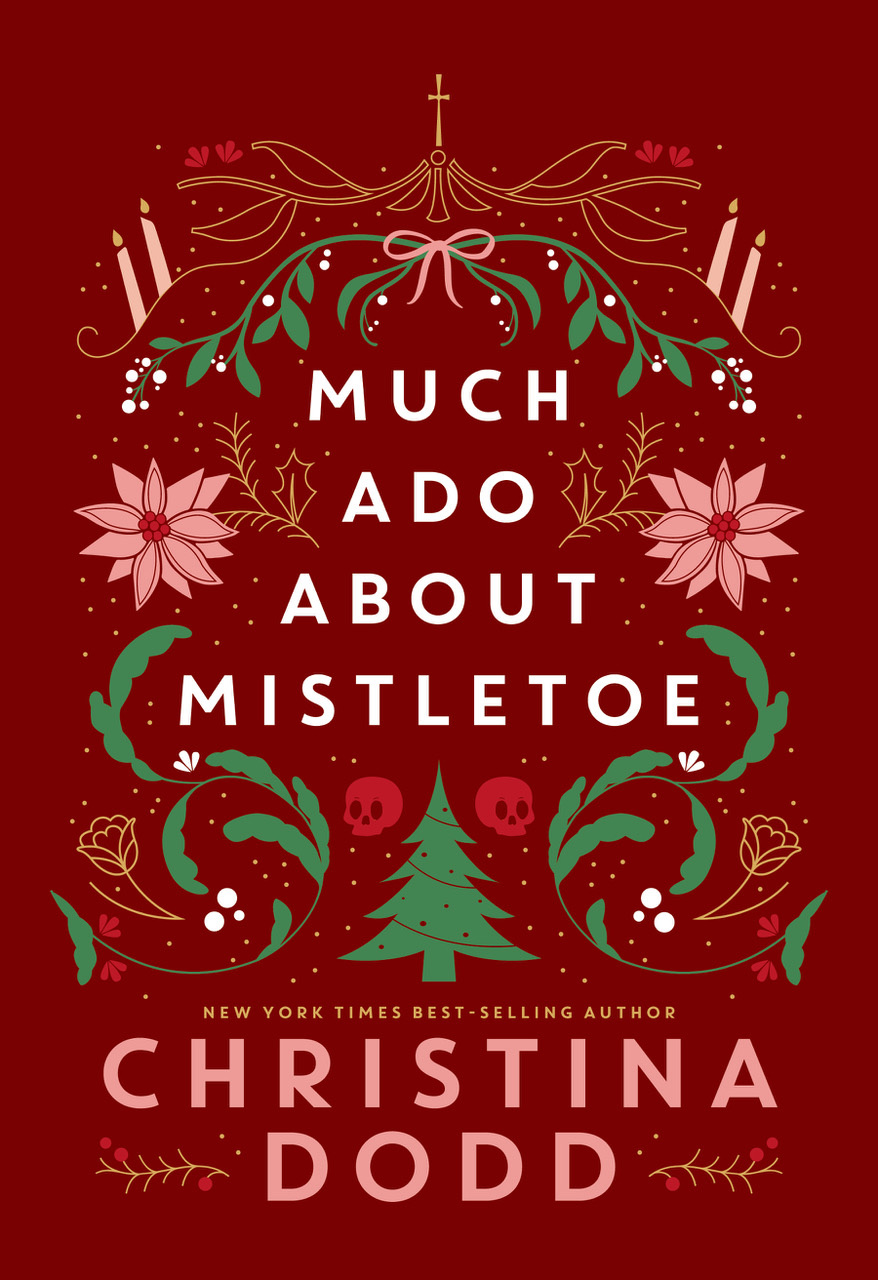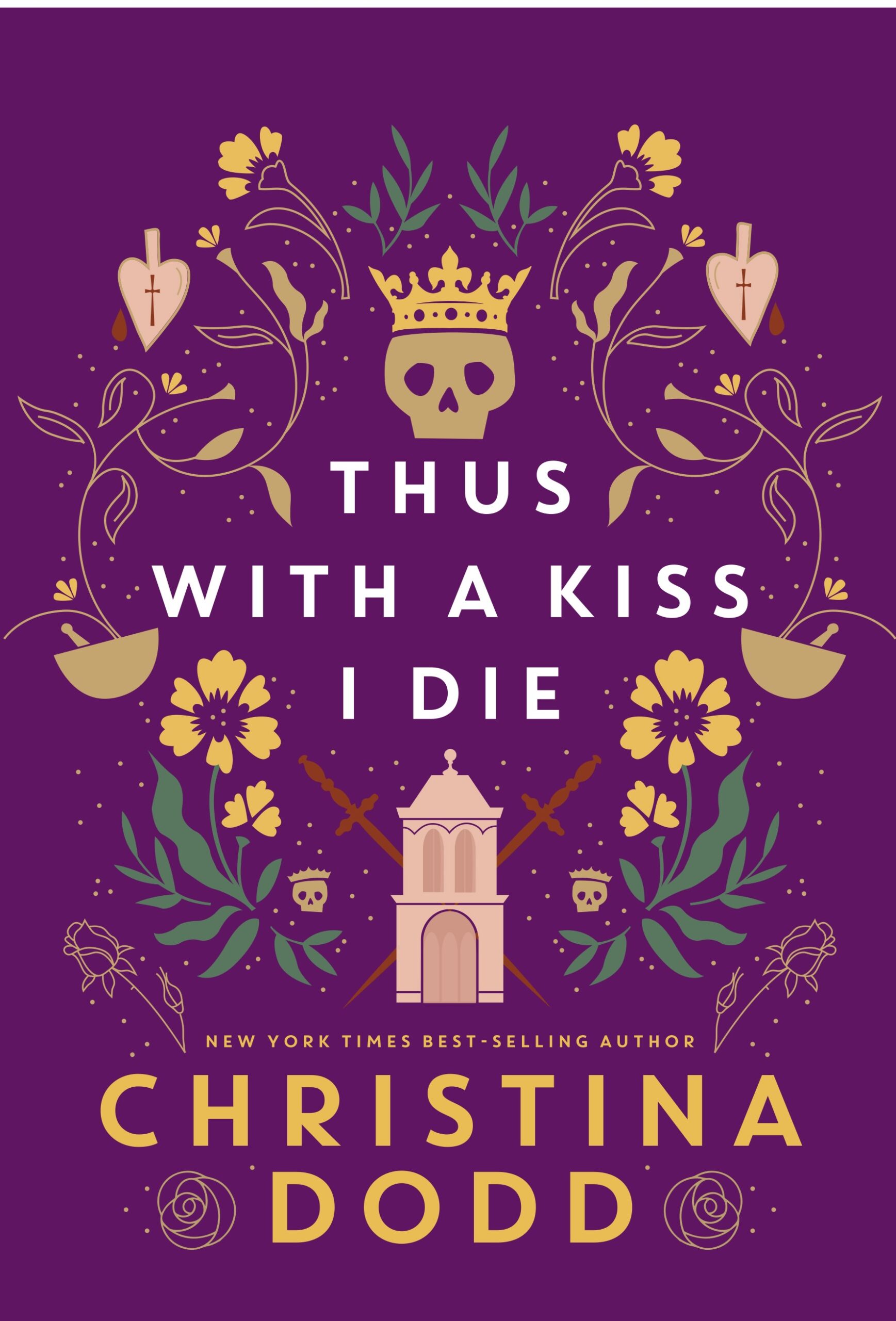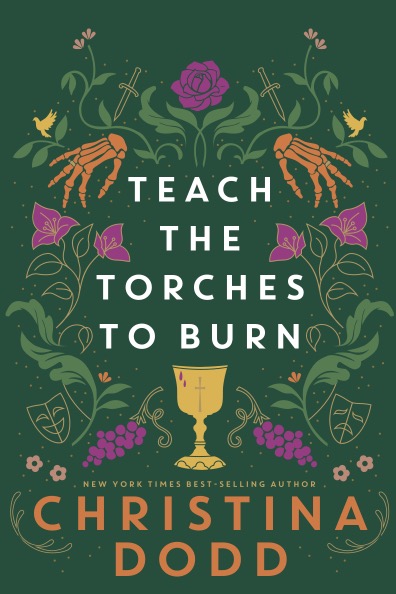
Daughter of Montague #3
June 30, 2026
Kensington Books (A John Scognamiglio Book)
ISBN-10: 1496750225
ISBN-13: 9781496750228
Available in: Hardcover, e-Book
BUY NOW
Hardcover
Barnes & Noble
Bookshop
Books-A-Million
eBook
Barnes & Noble
Kobo
Google Play
Apple Books
Indigo
Bookshop
More Buying Options
Katy
Indigo
Goodreads
Poisoned Pen
Teach the Torches to Burn
Romeo and Juliet (yes, that Romeo and Juliet) invite you to join them in celebrating the marriage of their spinster daughter, Rosie (she’s 20!) to Escalus the younger, prince of Verona, where murder is the unexpected guest at the wedding.
My Lady Jane meets Knives Out in Fair Verona, as New York Times bestselling author Christina Dodd brings you the wedding of the season star-crossed with poison most discreet.
Joining us will be the famously rival families, the upstart Montagues and the snooty Capulets. All will be armed with sharp blades. . . . Also attending are the Leonardis, royal and decorous kin of the groom.
If I, the aforesaid Rosie, blushing bride and witty sleuth, were to identify when events spiraled out of control, I’d point to that moment when elderly Princess Ursula observed the display of gleaming swords and bared teeth and announced that she would hold a séance to determine the future of the marriage.
With the aid of Yorick’s skull and her considerable dramatic nature, she prophesied three things: the marriage would be joyous and fertile (guests yawn,) a long-lost treasure would be found (mildly interesting . . . ) and foul and most unnatural murder would disrupt the fragile peace of Verona.
Before the day was done, two prophesies had been fulfilled. Hint: not the fun fertility one. As one death follows another and it’s clear a skilled poisoner lurks among us, I use all my skill to discern the reason for the deadly vendetta and uncover the killer’s identity . . . for I desire that the church bells that now ring a lament instead peel for the wedding and the joyous future foretold. . .
In the Great Hall of the palace of Prince Escalus the younger
In fair Verona where we lay our scene
If I have to pinpoint the moment when events spiraled out of control, it was when Dowager Princess Ursula, who spreads terror before her like a farmer spreads manure, looked around at the display of gleaming swords, sharp knives and bared teeth, and with all the drama at her fingertips announced, “At sunset, I shall hold a public séance to determine the future of this marriage between Lady Rosaline of the House of Montague and Prince Escalus the Younger of the House of Leonardi!”
Beside me, Prince Escalus muttered, “Blessed Mother, here we go.” He might sound disgruntled, but he sheathed his knife in his belt and indicated I should return mine to the holster I kept strapped to my arm.
Those of my younger sisters who were present, Vittoria, Susanna, Katherina and Imogene, did the same, and Papà and Mamma assumed their “happy parents of the bride” posture. Thankfully, siblings Emilia and Cesario both worked for the prince running errands, Emilia in the palace and Cesario on the streets.
Cal knew his wily, wicked grandmother would succeed in pouring oil on the turbulent sea of emotions, for Princess Ursula's séances were famed for their interesting (the less charitable would say hammy) stagecraft and for the occasional ghostly apparitions that appeared, or were said to appear, or whatever. Occasionally her prophecies came true, mostly because people so badly wanted to believe. Sometimes, based on her own observations, she was right, and occasionally she got lucky. As she once told me, Even a blind pig finds a truffle sometimes.
You can bet with Princess Ursula's announcement, everyone calmed the inferno down. Knives became eating instruments, swords were out merely to admire the decoration on the hilts, and Papà and Nonno Montague poured another round of wine that beautifully complimented the cheese, bread and apples placed on covered boards in all corners of the room.
I am Lady Rosaline (aka The Bride,) and I’m the daughter of Romeo and Juliet (contrary to the assertions of a certain famous playwright, they’re alive, happy and the parents of nine.)
The playwright was correct about some salient points. My parents’ families, the Montagues and the Capulets, were in fact, knife-point enemies, and of course all were invited to the wedding, creating a situation that…
How to put this tactfully?
I love my family. I really do. Taken individually, they’re great folks. But put them together…
Every one of Romeo and Juliet’s children (except the twins, and they were infants) knows they owe their existence to the detente forced by the discovery that Papà and Mamma had taken matters in their own hands, got married and pregnant in one night (with me) and by a serious attempt at mutual suicide (funny story, that) healed their families’ strife.
What do the Montagues and the Capulets have to quarrel about?
Nothing. Nothing, I tell you! Their similarities are greater than their differences. Both families are wealthy, respected households of Verona, with far-flung connections throughout the Italian peninsula.
The Montagues are loud, tempestuous, fertile, brimming with life and humor.
The Capulets imagine themselves to be the more refined family; that is to say, they are not nouveau riche. They’re almost-aristocratic nose-in-the air-riche.
The Montagues are definitely nouveau; growers and vintners, makers of fine wines and wooed by all the best exporters and suppliers of all the city-states.
My dear, the vendetta ended twenty years ago, or as the older kin call it, “The good old days.” Memories are long in fair Verona, although when I sensibly inquire what started the feud, no one quite remembers that.
During any kind of family gathering, we kids take our roles as diplomats and peacemakers seriously. We circulate, we head off quarrels, we keep certain members as distant as possible, including some husbands and wives, and if we’re too late to step in and stop the fight, we bandage wounds and mop up blood.
At this point, I’d like to point out the obvious; when someone’s standing over a body holding a bloody blade, everyone knows who’s dead, and who’s guilty. That clarity was a blessing much lacking in later events.
Of course, not only the Montagues and the Capulets were implicated in this marital casker…er, celebration. Also in attendance (obviously) was the groom and his family.
The Leonardis are quiet, restrained, royal, cautious. The immediate family consists of my betrothed, Prince Escalus the younger, his adolescent sister Princess Isabella, and his paternal grandmother, dowager Princess Ursula. In addition, there are his three loyal companions and bodyguards, Dion, Marcellus and Holofernes.
You’re right, and I must agree. Our families are mismatched in temper and in social station. Yet invitations were issued and sent to honored guests and relations far and wide, leaving none out for fear of grudges, ancient or newly ignited.
Princess Ursula held out her arm to me. “Dear new principessa del mio cuore, help me go and prepare to receive my ghostly guide.” In an aside to her aged friend, Lady Pulissena of the House of Acquasasso, she said, “My guide is poor Yorick, my jester, that man of infinite wit and charm.”
“I knew him well, and there was nothing he loved more than to assist you.” Lady Pulissena sounded solemn and as if she believed, when in fact I knew these two elderly women enjoyed nothing so much as to make fools of us mortals and chortle later.
I put my hand under Princess Ursula's arm.
She placed the tip of her cane firmly on the floor, and with all appearance of frailty, she allowed herself to be hoisted to her feet.
Why, you ask, did the servants and her grandson not hasten to assist such an aged lady?
Because Nonna Ursula (she had commanded I call her Nonna) resented unasked-for help and her wooden cane was both heavy and enthusiastically wielded.
As we made our way through the long gallery with walls decorated in fresco by the finest artists on the Italian peninsula, with marble statues created by some long dead Roman sculptor, with lamps of precious, colorful glass made on the isle of Marino each illuminated with a single candle crowded past the tables in to the palace library, Nonna Ursula said, “Make haste, make haste! For we must catch the setting sun!”
Needless to say, I was not the obstacle to haste, but I refrained from saying such to a woman weighed with years, crippled in the joints, deafened by time, whose milky eyes could see nothing clearly. Instead I called Princess Isabella to my side, for she was a wise fanciula and had left the contentious party on our heels. “Fetch Nonna Ursula's bag from her suite.” I dropped my voice ominously. “You know the one I mean.”
“I do indeed.” She rushed down the corridor.
With our studied pace down the gallery, I was at leisure to study the young principessa. In the last months, as we prepared for the wedding, Isabella had grown taller and although she was but thirteen years old, her form had become that of a slender blond lady of quality. In public, she was the female embodiment of her brother, with an untouchable impression of royalty, but the Montague family had done much to teach her about family, joy, friendship and support.
My seven-year-old brother, Cesario, is infatuated with her, and when he’s not running errands for the prince (a job he takes seriously,) he follows Isabella around and adores her with his eyes. She says it’s like having a puppy, but housetrained.
Nonna Ursula was watching Isabella, too, for she said, “You and your parents have been good for that girl. She doesn’t brood as much.”
“Adolescence is a tough time. I remember…”
“So do I.” No matter how many years separated us from that traumatic time, we women did understand.
In the gallery outside the library, long tables had been set up to display the wedding gifts. They ranged from small, handmade gifts from the children of Verona to gifts from ruling families of far-flung ally city-states, from carvings done by local fishermen to gifts from every friend and relative of mine and Cal's and every supplicant hoping to influence the Leonardis to view them with favor.
For most people, these festivities weren’t a marriage so much as an occasion to liven up the dark chill of winter. That was actually a huge part of the problem.
If the Montagues and the Capulets could have sauntered along the wide avenues of Verona, breathing the winter’s chill, smirking and biting their thumbs, keeping some distance between themselves and the old, moldering quarrels, the violence would have been less contained, more bombastic, a lot of slashing and swearing and not much stabbing and lamenting. Fresh air had a way of diluting the—dare I say it?—childish irascibility.
But Cal had insisted we be married on the first day of winter, and thus we approached the darkest day making it difficult to saunter and smirk and bite. As if to compound the problem, a chill had settled in from the iron north, from the Alps, from the barbarian cold lands and the restless bitter seas. The poor suffered and the rich stayed inside to quarrel like children old enough to know better.
Within the library were the shelves with scrolls and books, small, old mosaics and tall, marble vases. Before the west-facing window a small round parquet table waited with an unlit candelabra placed squarely in the middle.
Nonna Ursula glanced out the window, then at the ornately carved chair she reserved as the leader of the séances. “Move it to this place.” She tapped the floor with her cane.
I knew why, for I’d attended one of her séances before. I tugged it into place.
She lowered herself palmo by painful palmo into the seat.
I lit the beeswax candles one by one and arranged other chairs around the table. Nonna Ursula would allow only females to accompany her on her spiritual journeys, and I ticked off her chosen companions in my head: Mamma, my younger sisters Katherina and Imogene, Princess Isabella, and me. Mamma had judged eight-year-old Emilia still too young to participate and knowing that feckless child, I imagined the restriction remained. I looked to Nonna Ursula. “Will Lady Pulissena join us?”
“You couldn’t keep that nosy old lupa away,” Nonna said loudly.
“I came early for a good seat.” The nosy old lupa entered on Mamma's arm with my sisters trailing behind.
The two elderly women cackled.
Imogene, my twelve-year-old and naturally blunt sister, said, “You two really do sound like streghe!”
Unoffended at being called witches, and perhaps even complimented, the elderly women cackled again, and Lady Pulissena took the place opposite Nonna Ursula.
Lady Pulissena of the House of Acquasasso also now resides in the palace, sharing Nonna Ursula's rooms. She and Nonna Ursula are best friends forever…except when they were enemies. Fifteen years ago, Lady Pulissena’s husband fomented a revolt against the Leonardis, a revolt that ended in Prince Escalus the elder’s death and Prince Escalus the younger’s prolonged visit to their dungeon. Such was Lady Pulissena's reputation for strategy, Nonna Ursula and Cal (I call him Cal) (because I can, and because it annoys him) believed she had in fact guided the revolution.
Naturally, that left a bitter taste in Prince Escalus's mouth, and only recently was Lady Pulissena allowed to return from exile. Age and loss bonded the elderly ladies in ways no one could have imagined, and now, whether we liked it or not, she and Nonna Ursula were a Greek chorus at every gathering.
We took our seats around the table.
Guests filtered in, filling the great library, surrounding the table, overflowing into the corridor, shoving for the best location.
“Shall I forbid the men?” I quietly asked Nonna Ursula.
She viewed them through narrowed eyes. “No. They need to see this in person, not by female hearsay.” Using her powerful voice, she projected it to the corners of the room. “Only females may surround the table! The men with their beastlike demeanors thwart the spirits we seek.”
No one moved. No one obeyed.
From near the door, Prince Escalus added, “Your prince would hate to think anyone here can imagine himself to be above obeying the dowager princess of Verona, respected and beloved of the Leonardi family.” Although he spoke softly, his voice was heard.
The men retreated to the edges of the room. The women filled in around us.
It was not merely the authority in his tone that enforced his command. His sword craft was wicked fast and as prince, he enforced his will when needed.
“Where is the child?” Nonna Ursula looked around for Princess Isabella. “The sun is close to setting!”
Isabella made her way from the door with the requested black bag.
“Bring forth the contents!” I commanded.
“Uh-huh. Not going to do it.” She shoved the bag at me.
Fine. She remembered what was in there and she didn’t want to touch it. Neither did I, but I gritted my teeth, drew forth Yorick’s skull and with proper reverence placed him beside the candelabra.
The crowd quieted and for the first time I saw unease on some faces. No one enjoys such a blatant reminder of death.
Nonna Ursula intoned, as she did before every séance, “First, let us pray that Jesus, Mary and all the saints guide and protect us in our venture this day, for should the spirits venture forth, we seek only enlightenment and not a haunting.” She meant it, too, because invoking the spirits of the dead was a risky and unholy business and when we made confession, we would each perform the appropriate contrition.
I clasped the cross I wore on the gold chain around my neck, and clasped as well the tiny, yellow bird with sparkling wing tips that dangled with it. Cal had gifted the bird to me on St. Lucy’s Eve; so exquisite, so bright, so lovingly constructed, with the outline of every feather and every toe clearly etched in the enamel. The bird had been a symbol to him; he had called me his “small, singing, sunshiny, breath of bracing air that wafts into the darkest night on a dream.” His darkest night had been suffered in the dungeon, so to know the knowledge of me sustained him…that was a gift to me, as well, and an explanation, perhaps, for his seemingly sudden intention to wed…me.
When I lifted my head from my own devout prayer, I looked around at the finely dressed aristocrats and merchants and thought the churches would be crowded with many penitent men and women. I hoped Nonna Ursula would provide a show worthy of their future aching knees.
“We begin.” Nonna tapped on Yorick’s skull, which echoed with the chilling sound of hollow bone. She gestured, and with appropriate solemnity, we at the table followed suit.
From the corners of my eyes, I saw some shudders and uneasy glances, and I also heard a few manly snorts.
Prince Escalus cleared his throat.
The snorting stopped.
No wonder Nonna didn’t allow men in her séances. They defended their fears with mockery.
Nonna faced the sun as it slid toward the horizon. The light cruelly revealed every wrinkle and dark hair on her upper lip, her drooping nose and thin, veined eyelids. She indeed resembled a fearsome witch and she used her authoritative, aristocratic tone to heighten the effect. “For Prince Escalus of Verona and Rosaline of the House of Montague, I predict a magnificent wedding that will live as a shining example of peace and love in the memories of all who attend.” She turned her head from side to side to pin the Montagues and the Capulets in her white-blind gaze. "No fighting!”
I looked at the skull of Yorick.
He grinned as if even he didn’t believe it possible.
“I foresee a long, happy, fertile marriage blessed with many sons.” For one moment, she returned to her normal, dowager princess tone. “After all, her Mamma Juliet has given birth to nine children, all living, and some in duplicate.”
Laughter rippled through the guests. My youngest brothers, still babes in arms, were twins.
“Who better to carry forth the romantic legend of Romeo and Juliet than their progeny?” I asked.
Mamma slanted a smile at her daughters around the table, then at her Romeo, and he, of course, stared soulfully and adoringly at her. A gusty sigh swept the room. Only the most pinch-mouthed and cynical could resist the loving glow that shimmered between them and I was forcibly reminded that yes, true love did exist in this world.
My lower lip trembled briefly.
But not for me. You see, although I marry Prince Escalus, I love Another. I continue as I am, a practical woman who has been chosen by a prince for her practical virtues.
I know. A wife of a prince of strength and character who went to great lengths to secure a betrothal to me? Boo-hoo, Rosie. Cry me a river.
Nonna returned to her I’m a seer voice. “Among the wedding gifts a long-lost treasure will be found which will end an old feud.”
That was interesting. Specific. I scrutinized Nonna Ursula. How had she come up with that? Did she know something, or was she stalling for some reason only she knew…?
Like a stage light created by candles and mirrors, the last rosy ray of the sun struck her face and lent her with the blush of artificial youth. It wasn’t that, though, that brought a gasp from the guests. The sun’s final flame bounced off her cloudy eyes and they shone a fiery red.
Lady Luce, tmalicious gossip and Montague neighbor, give a moan and performed the dramatic swoon for which she was justly famous.
Looking like an apparition herself, Nonna Ursula lifted one finger and in a voice deep and prophetic, she proclaimed, “But first, a murder! Hatred such as I’ve never seen! A man dies horribly, and acrimony spreads, and death, and more death, challenging Verona’s long-held peace! Only through wisdom and the lost art of listening will disaster be averted!” She froze, staring into the shaft of light, her eyes still lit by that demonic glow.
Lady Pulissena gave a shriek and reached out to Nonna with trembling arms. “My royalty! My oracle! Death! Disaster! You strike fear in my heart! You must take care!”
As if God was Nonna Ursula's stage manager, the sun slid below the horizon and the light vanished, leaving her a mere woman, aged, gray, prune-faced, not a prophetess but a frail, elderly princess who had seen too many days.
She collapsed, lifeless, in her chair.
BUY NOW
Hardcover
Barnes & Noble
Bookshop
Books-A-Million
eBook
Barnes & Noble
Kobo
Google Play
Apple Books
Indigo
Bookshop
More Buying Options
Katy
Indigo
Goodreads
Poisoned Pen


